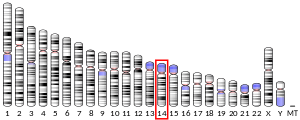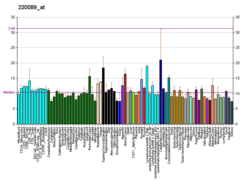L2HGDH
L-2-hydroxyglutarate dehydrogenase, mitochondrial is an enzyme that in humans is encoded by the L2HGDH gene, also known as C14orf160, on chromosome 14.[5][6]
Function
This gene encodes L-2-hydroxyglutarate dehydrogenase, a flavin adenine dinucleotide (FAD)-dependent enzyme that oxidizes L-2-hydroxyglutarate to alpha-ketoglutarate in a variety of mammalian tissues. Mutations in this gene cause L-2-hydroxyglutaric aciduria, a rare autosomal recessive neurometabolic disorder resulting in moderate to severe mental retardation.[6]
L2HGDH codes for a protein that is 50 kDa in size. The L2HGDH protein contains a mitochondrial-targeting transit peptide[7] and is localized to the mitochondrial inner membrane inside mitochondria inside the cell. The L2HGDH protein catalyzes the following reaction, and requires flavin adenine dinucleotide (FAD) as a co-factor:
(S)-2-hydroxyglutarate + acceptor = 2-oxoglutarate + reduced acceptor.[5]
L-2-hydroxyglutarate is produced by promiscuous action of malate dehydrogenase on 2-oxoglutarate; the L2HGDH protein is thus an example of a metabolite repair enzyme because it reconverts the useless damage product L-2-hydroxyglutarate back to 2-oxoglutarate.
Clinical significance
Mutations in the L2HGDH gene cause L-2-hydroxyglutaric aciduria, a rare autosomal recessive neurometabolic disorder. Individuals with L2HGDH mutations present toxic accumulation of high concentration of L-2-hydroxyglutaric acid in the plasma and cerebrospinal fluid.[8] At least 70 disease-causing variants in the L2HGDH gene have been discovered in patients.[9] Patients with L-2-hydroxyglutaric aciduria are associated with moderate to severe mental retardation, psychomotor retardation, cerebellar ataxia, macrocephaly, or epilepsy.[9]
L2HGDH has a role in mediating differentiation in T-cells via its activity on S-2HG [10]
Molecular interactions
See also
References
- GRCh38: Ensembl release 89: ENSG00000087299 - Ensembl, May 2017
- GRCm38: Ensembl release 89: ENSMUSG00000020988 - Ensembl, May 2017
- "Human PubMed Reference:". National Center for Biotechnology Information, U.S. National Library of Medicine.
- "Mouse PubMed Reference:". National Center for Biotechnology Information, U.S. National Library of Medicine.
- Rzem R, Van Schaftingen E, Veiga-da-Cunha M (Jan 2006). "The gene mutated in l-2-hydroxyglutaric aciduria encodes l-2-hydroxyglutarate dehydrogenase". Biochimie. 88 (1): 113–116. doi:10.1016/j.biochi.2005.06.005. PMID 16005139.
- "Entrez Gene: L2HGDH L-2-hydroxyglutarate dehydrogenase".
- "L2HGDH - L-2-hydroxyglutarate dehydrogenase, mitochondrial precursor - Homo sapiens (Human) - L2HGDH gene & protein". www.uniprot.org.
- Vilarinho L, Tafulo S, Sibilio M, Kok F, Fontana F, Diogo L, Venâncio M, Ferreira M, Nogueira C, Valongo C, Parenti G, Amorim A, Azevedo L (Jan 2010). "Identification of novel L2HGDH gene mutations and update of the pathological spectrum". Journal of Human Genetics. 55 (1): 55–8. doi:10.1038/jhg.2009.110. PMID 19911013.
- Steenweg ME, Jakobs C, Errami A, van Dooren SJ, Adeva Bartolomé MT, Aerssens P, et al. (April 2010). "An overview of L-2-hydroxyglutarate dehydrogenase gene (L2HGDH) variants: a genotype-phenotype study". Human Mutation. 31 (4): 380–90. doi:10.1002/humu.21197. PMID 20052767.
- Tyrakis PA, Palazon A, Macias D, Lee KL, Phan AT, Veliça P, You J, Chia GS, Sim J, Doedens A, Abelanet A, Evans CE, Griffiths JR, Poellinger L, Goldrath AW, Johnson RS (Dec 2016). "S-2-hydroxyglutarate regulates CD8+ T-lymphocyte fate". Nature. 540 (7632): 236–241. doi:10.1038/nature20165. PMC 5149074. PMID 27798602.
- Huttlin EL, Ting L, Bruckner RJ, Gebreab F, Gygi MP, Szpyt J, et al. (Jul 2015). "The BioPlex Network: A Systematic Exploration of the Human Interactome". Cell. 162 (2): 425–40. doi:10.1016/j.cell.2015.06.043. PMC 4617211. PMID 26186194.
Further reading
- Duran M, Kamerling JP, Bakker HD, van Gennip AH, Wadman SK (1981). "L-2-Hydroxyglutaric aciduria: an inborn error of metabolism?". Journal of Inherited Metabolic Disease. 3 (4): 109–12. doi:10.1007/BF02312543. PMID 6787330.
- Jansen GA, Wanders RJ (Nov 1993). "L-2-hydroxyglutarate dehydrogenase: identification of a novel enzyme activity in rat and human liver. Implications for L-2-hydroxyglutaric acidemia". Biochimica et Biophysica Acta (BBA) - Molecular Basis of Disease. 1225 (1): 53–6. doi:10.1016/0925-4439(93)90121-g. PMID 8241290.
- Topçu M, Jobard F, Halliez S, Coskun T, Yalçinkayal C, Gerceker FO, Wanders RJ, Prud'homme JF, Lathrop M, Ozguc M, Fischer J (Nov 2004). "L-2-Hydroxyglutaric aciduria: identification of a mutant gene C14orf160, localized on chromosome 14q22.1". Human Molecular Genetics. 13 (22): 2803–11. doi:10.1093/hmg/ddh300. PMID 15385440.
- Rzem R, Veiga-da-Cunha M, Noël G, Goffette S, Nassogne MC, Tabarki B, Schöller C, Marquardt T, Vikkula M, Van Schaftingen E (Nov 2004). "A gene encoding a putative FAD-dependent L-2-hydroxyglutarate dehydrogenase is mutated in L-2-hydroxyglutaric aciduria". Proceedings of the National Academy of Sciences of the United States of America. 101 (48): 16849–54. doi:10.1073/pnas.0404840101. PMC 534725. PMID 15548604.
- Vilarinho L, Cardoso ML, Gaspar P, Barbot C, Azevedo L, Diogo L, Santos M, Carrilho I, Fineza I, Kok F, Chorão R, Alegria P, Martins E, Teixeira J, Cabral Fernandes H, Verhoeven NM, Salomons GS, Santorelli FM, Cabral P, Amorim A, Jakobs C (Oct 2005). "Novel L2HGDH mutations in 21 patients with L-2-hydroxyglutaric aciduria of Portuguese origin". Human Mutation. 26 (4): 395–6. doi:10.1002/humu.9373. PMID 16134148.
- Struys EA, Gibson KM, Jakobs C (Oct 2007). "Novel insights into L-2-hydroxyglutaric aciduria: mass isotopomer studies reveal 2-oxoglutaric acid as the metabolic precursor of L-2-hydroxyglutaric acid". Journal of Inherited Metabolic Disease. 30 (5): 690–3. doi:10.1007/s10545-007-0697-5. PMID 17876720.




